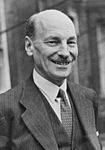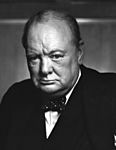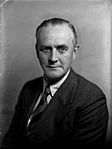1950 United Kingdom general election facts for kids
|
|||||||||||||||||||||||||||||||||||||||||||||
|
|
|||||||||||||||||||||||||||||||||||||||||||||
|
All 625 seats in the House of Commons 313 seats needed for a majority |
|||||||||||||||||||||||||||||||||||||||||||||
|---|---|---|---|---|---|---|---|---|---|---|---|---|---|---|---|---|---|---|---|---|---|---|---|---|---|---|---|---|---|---|---|---|---|---|---|---|---|---|---|---|---|---|---|---|---|
| Opinion polls | |||||||||||||||||||||||||||||||||||||||||||||
| Turnout | 83.9% |
||||||||||||||||||||||||||||||||||||||||||||
|
|||||||||||||||||||||||||||||||||||||||||||||
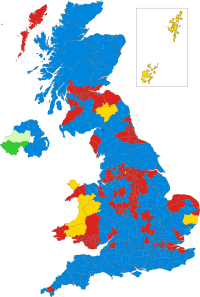
Colours denote the winning party
|
|||||||||||||||||||||||||||||||||||||||||||||
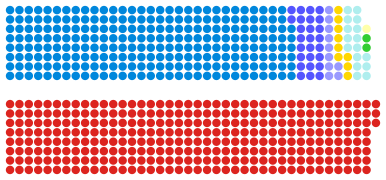
Composition of the House of Commons after the election
|
|||||||||||||||||||||||||||||||||||||||||||||
|
|||||||||||||||||||||||||||||||||||||||||||||
The 1950 United Kingdom general election was an important election held on Thursday, February 23, 1950. It was the first election after the Labour Party had been in charge for a full five-year term. This election also introduced some big changes. For example, people could no longer vote more than once if they owned property in different areas. Also, special voting rights for university graduates were removed.
Even though Labour won, their lead over the Conservative Party became much smaller. Their majority in Parliament dropped from 146 seats to just 5. This meant they had less power to pass new laws easily. There was a noticeable shift in votes towards the Conservatives, who gained 90 seats. Because their majority was so small, Labour decided to call another election in 1951, which the Conservatives then won.
This election saw a very high number of people voting, with 83.9% of eligible voters participating. This was the highest turnout in a UK general election where everyone could vote. It was also the first time a general election was shown on television, though the broadcasts were not recorded. A famous BBC presenter, Richard Dimbleby, hosted the TV coverage.
Contents
Why the 1950 Election Was Important
This election marked a key moment in British politics. It showed how the country was changing after World War II. The way people voted and the issues they cared about were different from before.
Changes to Voting Rules
Before this election, some people could vote more than once. For example, if you owned property in different areas, you could vote in each of those areas. Also, university graduates had their own special constituencies where they could vote.
However, new laws like the Representation of the People Act 1948 and the House of Commons (Redistribution of Seats) Act 1949 changed this. These laws made voting fairer by giving everyone one vote. They also redrew the boundaries of many voting areas, creating 11 new seats in England and changing over 170 others across the country.
What Parties Talked About During the Campaign
The election campaign was a time when political parties tried to convince voters. They talked about their plans for the country's future.
Conservative Party's Message
The Conservatives had lost badly in the 1945 election. But by 1950, they had recovered. They accepted many of the changes made by the Labour government. This included the National Health Service, which provides free healthcare, and the idea of a mixed economy, where the government controls some industries.
Their main election promises focused on freedom. They felt that the Labour government had taken away some freedoms. The Conservative leader, Winston Churchill, argued that Labour had "levelled down" society instead of "levelling up."
Labour Party's Plans
Labour wanted to continue their policies. They supported the idea of the government taking control of more industries. This was a big difference between them and the Conservatives. The Liberals saw this as a struggle between different social classes.
Rationing and Daily Life
A major issue for many people was rationing. Even five years after World War II ended, many foods like meat and even sweets were still limited. Petrol was also rationed.
The Conservatives promised to end rationing. Labour, however, wanted to keep it going for a while longer. This was a very unpopular idea for many families.
Why Labour Lost Support
Labour lost many seats, especially in areas around London. These areas were often home to middle-class voters. People were tired of the government's strict spending rules and rising prices.
Rationing of basic foods, like bread and powdered egg, was particularly disliked. When Labour leader Clement Attlee campaigned, he sometimes faced angry crowds. Many middle-class people felt that Labour's policies were hurting them.
Liberal Party's Strategy
The Liberal Party tried to gain more power in this election. Their leader, Clement Davies, believed they needed to have more candidates running. They had fewer candidates in 1945, which he thought was a disadvantage.
To help with the cost, the Liberals even took out insurance. This insurance would pay them back if too many of their candidates lost their deposits (a fee candidates pay to run). However, this plan didn't work very well. While their overall vote percentage slightly increased, they lost more seats. Many of their candidates lost their deposits.
Election Outcomes and New Faces
The election results showed a big shift in political power.
Labour's Narrow Victory
The Labour Party won the election with 315 seats. However, this was 78 fewer seats than they had before. Their share of the total votes also went down slightly. This meant their majority in Parliament was very small, only 5 seats.
Conservative Gains
The Conservative Party made a strong comeback. They gained 90 seats, bringing their total to 298. Their share of the votes increased by more than 4%. This showed that many voters were moving away from Labour.
New Members of Parliament
Several people who would become very famous in British politics entered Parliament for the first time in this election. These included:
- Edward Heath
- Jo Grimond
- Enoch Powell
- Reginald Maudling
- Iain Macleod
Communist Party's Last MP
Willie Gallacher, who was the last Member of Parliament for the Communist Party of Great Britain, lost his seat in this election. This marked the end of the Communist Party having a voice in the UK Parliament.
Impact on the Labour Party
The election results caused some disagreements within the Labour Party. Some members, like Hugh Gaitskell, blamed others, like Aneurin Bevan, for the party's weaker performance. This led to different groups forming within the party, known as "Bevanites" and "Gaitskellites."
Images for kids
-
Composition of the House of Commons after the election
See also
- List of MPs elected in the 1950 United Kingdom general election
- 1950 United Kingdom general election in Northern Ireland
 | Ernest Everett Just |
 | Mary Jackson |
 | Emmett Chappelle |
 | Marie Maynard Daly |


